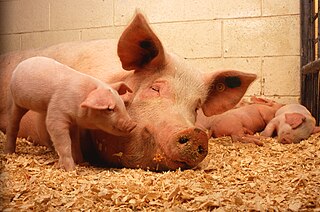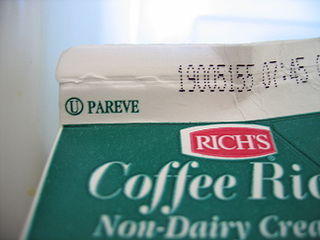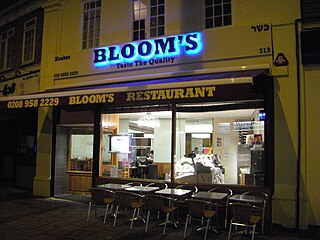Kashrut is a set of dietary laws dealing with the foods that Jewish people are permitted to eat and how those foods must be prepared according to Jewish law. Food that may be consumed is deemed kosher, from the Ashkenazi pronunciation of the term that in Sephardic or Modern Hebrew is pronounced kashér, meaning "fit". Food that may not be consumed, however, is deemed treif, also spelled treyf.
Kosher is food that may be consumed according to kashrut, or Jewish dietary laws.

Matzah, matzo, or maẓẓah is an unleavened flatbread that is part of Jewish cuisine and forms an integral element of the Passover festival, during which chametz is forbidden.

Passover, also called Pesach, is a major Jewish holiday, one of the three pilgrimage festivals, that celebrates the Biblical story of the Israelites' escape from slavery in Egypt. The Passover ritual is thought by modern scholars to have its origins in an apotropaic rite, unrelated to the Exodus, to ensure the protection of a family home.
Kitniyot is a Hebrew word meaning legumes. During the Passover holiday, however, the word kitniyot takes on a broader meaning to include grains and seeds such as rice, corn, sunflower seeds, and sesame seeds, in addition to legumes such as beans, peas, and lentils.

Kosher wine is wine that is produced in accordance with halakha, and more specifically kashrut, such that Jews will be permitted to pronounce blessings over and drink it. This is an important issue, since wine is used in several Jewish ceremonies, especially those of Kiddush.

In some religions, an unclean animal is an animal whose consumption or handling is taboo. According to these religions, persons who handle such animals may need to ritually purify themselves to get rid of their uncleanliness.

Jewish cuisine refers to the worldwide cooking traditions of the Jewish people. During its evolution over the course of many centuries, it has been shaped by Jewish dietary laws (kashrut), Jewish festivals and holidays, and traditions centred around Shabbat. Jewish cuisine is influenced by the economics, agriculture, and culinary traditions of the many countries where Jewish communities have settled and varies widely throughout the entire world.

Matzah balls or matzo balls are Ashkenazi Jewish soup morsels made from a mixture of matzah meal, beaten eggs, water, and a fat, such as oil, margarine, or chicken fat. Known as knaidel in Yiddish, they resemble a matzah meal version of knödel, bread dumplings popular throughout Central European and East European cuisine.

Kosher salt or kitchen salt is coarse edible salt usually without common additives such as iodine, typically used in cooking and not at the table. It consists mainly of sodium chloride and may include anticaking agents.

In kashrut, the dietary laws of Judaism, pareve is a classification of edible substances that contain neither dairy nor meat ingredients. Food in this category includes all items that grow from the ground, fish, eggs, and non-biological edible items.
Chametz are foods with leavening agents that are forbidden on the Jewish holiday of Passover. According to halakha, Jews may not own, eat or benefit from chametz during Passover. This law appears several times in the Torah; the punishment for eating chametz on Passover is the divine punishment of kareth.
The Islamic dietary laws (halal) and the Jewish dietary laws are both quite detailed, and contain both points of similarity and discord. Both are the dietary laws and described in distinct religious texts: an explanation of the Islamic code of law found in the Quran and Sunnah and the Jewish code of laws found in the Torah, Talmud and Shulchan Aruch.

A kosher restaurant or kosher deli is an establishment that serves food that complies with Jewish dietary laws (kashrut). These businesses, which also include diners, cafés, pizzerias, fast food, and cafeterias, and are frequently in listings together with kosher bakeries, butchers, caterers, and other similar places, differ from kosher-style businesses in that they operate under rabbinical supervision, which requires the observance of the laws of kashrut, as well as certain other Jewish laws, including the separation of meat and dairy.

Sabbath food preparation refers to the preparation and handling of food before the Sabbath, beginning at sundown Friday concluding at sundown Saturday, the Bible day of rest, when cooking, baking, and the kindling of a fire are prohibited by the Jewish law.
In Judaism, when the Eve of Passover falls on Shabbat, special laws regarding the preparation for Passover are observed.
The mixture of meat and dairy is forbidden according to Jewish law. This dietary law, basic to kashrut, is based on two verses in the Book of Exodus, which forbid "boiling a (goat) kid in its mother's milk" and a third repetition of this prohibition in Deuteronomy.
A kosher certification agency is an organization or certifying authority that grants a hechsher to ingredients, packaged foods, beverages, and certain materials, as well as food-service providers and facilities in which kosher food is prepared or served. This certification verifies that the ingredients, production process including all machinery, and/or food-service process complies with the standards of kashrut as stipulated in the Shulchan Arukh, the benchmark of religious Jewish law. The certification agency employs mashgichim to make periodic site visits and oversee the food-production or food-service process in order to verify ongoing compliance. Each agency has its own trademarked symbol that it allows manufacturers and food-service providers to display on their products or in-store certificates; use of this symbol can be revoked for non-compliance. Each agency typically has a "certifying rabbi" who determines the exact kashrut standards to be applied and oversees their implementation.

American Jewish cuisine comprises the food, cooking, and dining customs associated with American Jews. It was heavily influenced by the cuisine of Jewish immigrants who came to the United States from Eastern Europe around the turn of the 20th century. It was further developed in unique ways by the immigrants and their descendants, especially in New York City and other large metropolitan areas of the northeastern U.S.

Orthodox Union Kosher, known as OU Kosher or OUK, is a kosher certification agency based in New York City. It was founded in 1923 by Abraham Goldstein. It is the certification agency of about 70% of kosher food worldwide, and is the largest of the “Big Five” major certification agencies, which include OK, Kof-K, Star-K, and CRC.












